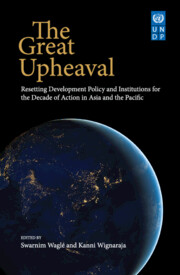Book contents
- Frontmatter
- Contents
- List of Figures
- List of Tables
- List of Boxes
- List of Appendices
- List of Abbreviations
- Foreword
- Acknowledgements
- Introduction
- 1 Aligning Sovereign Debt Financing with Climate Action in the Asia-Pacific Region
- 2 Melting Glaciers, Threatened Livelihoods: Confronting Climate Change to Save the Third Pole
- 3 Accelerating Universal Digital Connectivity
- 4 The Post-COVID-19 Future for Global Value Chains
- 5 Is Southeast Asia Falling into a Latin American–Style Middle-Income Trap?
- 6 Equality of Opportunity as a Measure of Development
- 7 Insights for Policymaking from the Multidimensional Poverty Index
- 8 COVID-19 and Human Security
- 9 Making COVID-19 Vaccine Universally Accessible
- 10 Enhancing the Provision of Global Public Goods: Ready for More Realism?
- 11 Asian-Pacific Regional Cooperation in the Post-COVID-19 Era
- 12 Pandemic Governance and Human Development: Early Lessons from Asia
- 13 Seven Lessons for Development Policy from the COVID-19 Pandemic
- About the Contributors
- Index
Foreword
Published online by Cambridge University Press: 28 February 2022
- Frontmatter
- Contents
- List of Figures
- List of Tables
- List of Boxes
- List of Appendices
- List of Abbreviations
- Foreword
- Acknowledgements
- Introduction
- 1 Aligning Sovereign Debt Financing with Climate Action in the Asia-Pacific Region
- 2 Melting Glaciers, Threatened Livelihoods: Confronting Climate Change to Save the Third Pole
- 3 Accelerating Universal Digital Connectivity
- 4 The Post-COVID-19 Future for Global Value Chains
- 5 Is Southeast Asia Falling into a Latin American–Style Middle-Income Trap?
- 6 Equality of Opportunity as a Measure of Development
- 7 Insights for Policymaking from the Multidimensional Poverty Index
- 8 COVID-19 and Human Security
- 9 Making COVID-19 Vaccine Universally Accessible
- 10 Enhancing the Provision of Global Public Goods: Ready for More Realism?
- 11 Asian-Pacific Regional Cooperation in the Post-COVID-19 Era
- 12 Pandemic Governance and Human Development: Early Lessons from Asia
- 13 Seven Lessons for Development Policy from the COVID-19 Pandemic
- About the Contributors
- Index
Summary
Being ready for the future requires unleashing our creativity, questioning our long-held assumptions, changing our behaviour and exercising adaptive governance to better use scarce resources. Above all, it requires greater investment in human development and institutional capabilities to confront the immense challenges of the 21st century – from climate change and growing inequalities to the digital transformation and rapid urbanization. While there is uncertainty whether and when the COVID-19 pandemic will become endemic, what is certain is that the pandemic has already changed our lives and livelihoods forever. This has profound implications for the way we will go on to organize and govern our societies. Multilateralism, the primary means to successfully tackle old and new development risks, is under strain in a world that is increasingly interdependent on the one hand, but torn by many nations’ tendencies to look inward. Yet the ground-breaking 2015 Paris Climate Accords and 2021 United Nations Climate Summit, COP26, point to an ever-increasing public and political appetite to realize a greener, net-zero-emissions future.
Countries in the Asia-Pacific Region perch on the frontlines of the climate crisis, given their densely populated coastal areas and inadequate institutional readiness. The effects of climate change will increasingly affect their high dependency on natural resources and agriculture for income and food. Therefore, moving Asian and other economies towards net-zero emissions to arrest climate disruption is a top priority. However, such a move will not happen automatically. An inclusive green recovery from COVID-19 and a just energy transition calls for political will, new systems and smart policies. In particular, countries must put a price on carbon, phase out fossil fuel subsidies and incentivize green infrastructure investments. Countries will also need to find new ways to raise funding to finance achievement of the United Nations Sustainable Development Goals (SDGs) – the world's internationally agreed plan to tackle challenges that range from eradicating poverty and inequality to protecting and restoring our natural world. Remarkably, allocating just 1 per cent of the total assets held by commercial banks, institutional investors and asset managers towards the SDGs could fill the annual financing gap. Other innovative finance mechanisms, such as debt-for-nature and debt-for-climate swaps, also hold enormous potential to catalyse much-needed financing for development.
- Type
- Chapter
- Information
- The Great UpheavalResetting Development Policy and Institutions in the Asia-Pacific, pp. xix - xxPublisher: Cambridge University PressPrint publication year: 2022

